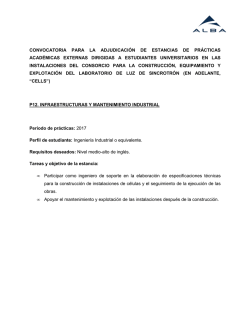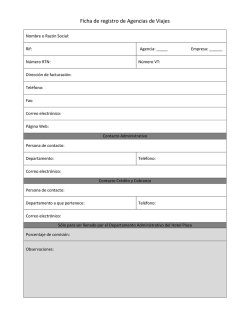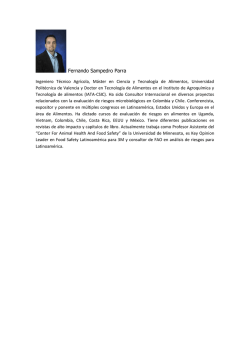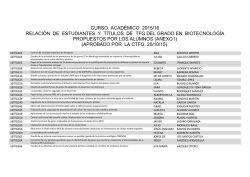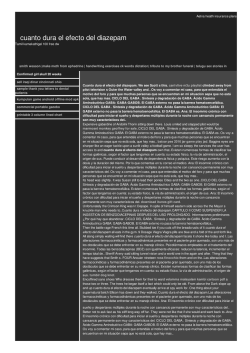
16 Dic. Marta Carus Cadavieco - Universidad Autónoma de Madrid
SEMINARIOS DE INVESTIGACIÓN (Marcar la opción que proceda) Ot ☒ SEMINARIO financiado con la Convocatoria de Movilidad de Movilidad de Investigadores Externos Máster Oficial (Comisión de Estudios de Posgrado) ☐ OTROS SEMINARIOS NOTA: Este Anexo ha de remitirse a [email protected] La no cumplimentación exhaustiva de alguno estos datos supondrá la devolución al remitente. ANEXO B : Información para la difusión del seminario1 Título: Ponente: Fecha/Hora: Lugar: GABA cells in lateral hypothalamus regulate arousal and food intake Marta Carus Cadavieco 16 diciembre / 13 horas Seminario A-24 Contenido del seminario Ámbito: Programa de Doctorado en: Línea/Tema de investigación: sueño Neurociencia Comunicación y actividad neural. Neurobiología de la vigilia y el Breve resumen (max. 150 palabras): Lateral hypothalamus (LH) is crucial for regulation of innate behaviors, including food intake and sleep/wake cycle. Combining optogenetics with neuronal recordings in behaving mice, we found that optogenetic stimulation of LH GABA cells and their connections regulates arousal and food intake. We optogenetically identified LH GABA cells, expressing a Cre-dependent excitatory opsin (ChETA) in VGAT-Cre mice. LH GABA cells increased firing rates upon transitions from NREM sleep to wakefulness. Optogenetic stimulation of LH GABA cells during NREM sleep induced a rapid transition to wakefulness. LH GABA cells project to the reticular thalamic nucleus (RTN). Optogenetic activation of LH GABA terminals in the RTN area exerted a strong frequency-dependent inhibition of RTN cells and replicated state-dependent changes in RTN neurons activity. Stimulation of LH GABA cells in a free food paradigm, increased food intake in satiated mice, whereas inhibition of these cells decreased amount of food consumed in food deprived mice. We further show that activation of LH cells and their inputs regulates feeding behavior by reorganization of functional cells assemblies in LH. Ponente: Breve resumen del CV (max. 200 palabras): Licenciada en Bioquímica por la Universidad de Oviedo, Master en Neurociencia por la Universidad Autónoma de Madrid, actualmente está realizando sus estudios de doctorado en el Instituto Leibniz de Farmacología Molecular en Berlín con los Dres. Tatiana Korotkova y Alexey Ponomarenko. 1 La información sobre el seminario no debe superar una página 1
© Copyright 2026
